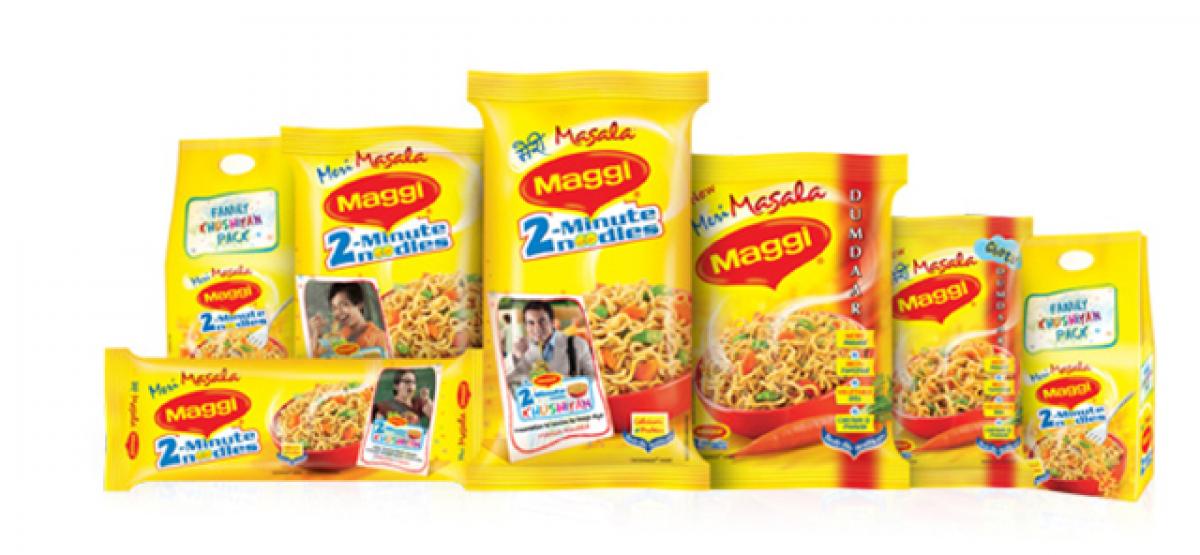Live
- ED conducts raids at two places in Bengal in chit fund case
- BJP Tamil Nadu President Expresses Confidence In Resolving Tungsten Mining Concerns In Madurai
- Karnataka Reviews Lake Safety Ahead of Monsoon: Minister Bhosaraju Tells Upper House
- Udupi MP’s queries, More key highways on high-priority
- Investing in Skills: Education Loans Paving the Way for Career Success
- Ghaggar river’s two stretches identified as polluted: Govt
- ICC chief Jay Shah meets Brisbane 2032 Olympics organising committee CEO
- Oxford Grammar High School Celebrates 44th Annual Sports Day with Grandeur
- Indian banking sector’s health remains robust, govt policy working very well: Top bankers
- iOS 18.2 Unveiled: New Features with ChatGPT Integration Revolutionize Your iPhone
Just In

Million deaths and counting. The Maggi noodles controversy reiterates the unsavoury fact that India is lax in ensuring packaged food safety. Even the US is not that alert.
The Maggi noodles controversy reiterates the unsavoury fact that India is lax in ensuring packaged food safety. Even the US is not that alert. Europe too has had many mishaps. It is surprising that the world over nobody is concerned over the real junk food being served by the largest companies across the globe. In terms of treating various ailments related to these, it costs billions of dollars to the consumers, says the World Health Organisation (WHO).

Maggie 2-minute noodles problem is not limited to the shores of this country. Europe and the US have been debating it for the past many years. Peoples’ lives across the world are at stake. In many countries there had been occasional hue and cry over the chemicals injected into food packed or put in deep freezer. Meat, fish and other sea food across the world are known to be injected with chemicals as preservatives and to give a fresh look weeks or months later.
The WHO estimates two million deaths linked to unsafe food annually, stated its regional director, Africa, Dr Matshidiso Moeti. Pregnant women, elderly people and children are the worst hit. The products tested by the researchers were made by major baby food manufacturers including Hipp, Organix, Nestle and Holle – some of which are available in British supermarkets.
Researchers found feeding infants twice a day on the shop-bought baby foods such as rice porridge can increase their exposure to arsenic by up to 50 times when compared to breast feeding alone. Exposure to other toxic metals such as cadmium, which is known to cause neurological and kidney damage, increased by up to 150 times in some of the foods tested by Swedish scientists.
The Maggie contaminant finding in India was more an aberration and wasn’t that the national food safety authorities were alert. But this brand of noodle alone may not be the culprit. There are many other brands in the market. Even many so-called health drinks, calcium supplements produced by other companies are equally suspect.
Advertising blitzkrieg leads to sale of many of such products to gullible buyers. Even skin whitening or beautifying cosmetics do more harm than what they promise to enhance. According to a new study from Europe, food packaging materials there contain as many as 175 dangerous chemicals. It is ditto with the United States.
“Scientific evidence has shown that contamination of food is a serious issue in India as unchecked microbial activity and the use of pesticides and antibiotics seriously compromise food safety, while consumption of junk food and other chemically-laced foods adds to the problem,” said Chandra Bhushan, Deputy Director General, CSE, in a statement.
Food adulteration, especially milk, is another key challenge, CSE said, adding that India can no longer afford to remain in the dilemma of whether it should provide ‘food’ or ‘safe food’ to all.” Yes, Nestle and others sell milk and other milk products in cans, which have hardly been tested.
Unfortunately, the doctors in this country are not exactly leading the discussion either, since nutrition is not currently a focus in medical school. Using banned ingredients that other countries have determined unsafe for human consumption has become a pandemic in this country. India has now to set standards to discontinue the use of banned ingredients to ensure food is without toxins.
By Shivaji Sarkar

© 2024 Hyderabad Media House Limited/The Hans India. All rights reserved. Powered by hocalwire.com







